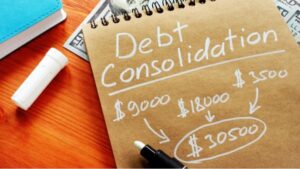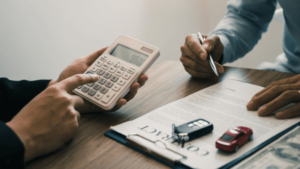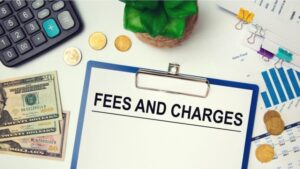What happens when you default on a loan, and how you can avoid it
Defaulting on a loan basically means you fail to pay off your debt. When this takes place, it may hurt your credit score, damage your overall finance, and lead to legal actions. Here, we dive into what happens when you default on a loan and the ways to get out of this situation.
Whether you’re just planning to take out a loan or you already have one, it’s crucial to gain insight into how a loan default works. And with this, you can take calculated steps to take charge of your loan.
What does it mean to default on a loan?
Defaulting on a loan happens when you fail to make the required payments on your loan. Meaning you miss your payments or stop paying your debt altogether. This can be from various reasons, like an emergency, a job loss, or unaffordable payments.
Beyond missing your payments, loan default can trigger a chain of events that may harshly impact your financial situation. Often, lenders may report you to credit bureaus and initiate debt collection efforts. And in other cases, it can even lead to legal actions to recover your outstanding balance.
What are the consequences of defaulting on a loan?
The consequences of loan default depend on what type of loan you have.
Defaulting on secured debts
Your assets are on the line
Secured loans mean you have collateral to back up your loan – be it your house, vehicle, savings account, or other assets. Remember, a secured loan is riskier for borrowers than lenders. You put your asset on the line when you have a secured debt.
Let’s say you take out a mortgage, which means your house is the collateral. But you lose your job, so you struggle with your payments. If you default on this loan, your lender can foreclose the house, so you lose your home.
Another instance is if you fail to pay off your auto loan. Because your car serves as collateral, your lender can reclaim your vehicle.
With this in mind, lenders can seize whatever asset you use as collateral when you default on a secured loan. In case your asset is not enough to cover your loan balance, your lender may either pursue debt collection or legal action.
Your credit score goes down
More than the loss of your collateral, defaulting on your loan also haunts your credit score. When you’re behind your payments for 30 days or longer, this appears on your credit report for 7 years. Since your payment history usually makes up 35% of your credit score, your score may also drop.
And when missed payments and credit score drops appear on your credit report, this influences how banks and lenders see you. Meaning you may find it hard to qualify for competitive interest rates. Sometimes, this may also lower your chances of getting approved for future loans.
Defaulting on unsecured debts
Unlike secured debts, unsecured loans do not require collateral to back them up. However, defaulting on an unsecured loan still has significant consequences.
For example, you have an unsecured personal loan or a credit card debt but go through financial difficulties. This may result in late payments and eventually, a loan default. When this happens, your lender can send your unpaid balance to its in-house collections or sell it to a debt collection agency.
Either way, this means the agency may call, text, mail, or email you nonstop to recover your debt. But if none of these approaches work, they may take you to court and sue you.
Similar to secured loans, late payments and loan defaults on unsecured debts also remain on your credit report for up to 7 years. And in turn, this affects your ability to qualify for future loans and favorable interest rates.
Defaulting on student loans
Student loans are typically unsecured, so there’s no collateral tied to them. Nonetheless, the consequences are still substantial; it’s just a matter of whether you have a federal or a private one.
Federal student loan default typically happens after 9 months or 270 days of missing your payments. And if you default on your federal student loan payments, your tax refunds may be withheld, and your wages may be garnished. Wage garnishment means a part of your earnings is withheld to pay back your creditor.
On the other hand, defaulting on private student loans may happen within 3 months or 90 days of missed payments. Private lenders don’t have the power to take your tax refunds or earnings. But they may collect your debt or take you to court. If they win the lawsuit against you, the court may potentially allow your creditor to garnish your wages or seize your assets.
Whether it’s federal or private, defaulting on student loans can hurt your credit history. This means it can put a dent in your credit report and lower your credit score. These, in turn, make it challenging to borrow in the future or may lead to higher interest rates.
How to avoid a loan default
Before things get worse, there are a few things you can do to prevent defaulting on your loan:
1. Ensure you can afford the monthly payments
Before you take out a loan, weigh your financial capacity. Take a close look at your income and expenses. Can you afford the monthly payments on top of your other bills? How much safety net will you have left in your budget if you factor in your loan?
Ensure you can comfortably manage your monthly payments before you agree with any lender.
2. Check your loan agreement
It also pays to carefully check your contract. Other than your interest rate and repayment schedule, pay attention to any penalties you may get. Will you pay late payment fees if you fall behind your monthly payments? What does the contract say about missed payments?
Being aware of these details helps you plan and avoid added costs that impact your budget.
3. Make timely payments
On-time payments can help you steer clear of loan defaults. For one, you can set reminders on your phone. Another option is to check if your lender offers autopay and think about signing up for it. This, in effect, eliminates any risk of missing your due dates.
4. Contact your lender as soon as possible
If you encounter any issues in meeting your payments, don’t hesitate to reach out to your lender. They may help you assess your case and offer alternatives to ease your burden, like debt consolidation, refinancing, or financial counseling. And in student loans, they may grant forbearance or deferment and reduce or suspend your payments until you get back on your feet.
5. Consider a cosigner or guarantor
A cosigner or guarantor can provide financial support to help you avoid loan default. If you’re at risk of defaulting, your cosigner or guarantor can step in and assume responsibility. This way, you can stay current on your payments and protect your credit.
How to recover from loan default
Defaulting on a loan is not the end of the world. If you already find yourself in this situation, there are some things you can do to get back on track.
The first thing is to contact your lender. They may be willing to help you work out your options and create a payment plan you can afford.
If this doesn’t work in your favor, consider speaking with a credit counselor. Credit counselors can assist you in managing your debts and recovering from loan default.
Then, if you need to get out of a federal student loan default, fortunately, you can go for loan rehabilitation. Student loan rehabilitation allows you to make nine lower monthly payments for a period of 10 months. Depending on your holder, your monthly payments may be 15% of your discretionary income or sometimes even lower.
How does defaulting on a loan affect your credit?
As mentioned previously, defaulting on any loan impacts your credit score. Lenders may report you to credit bureaus – this then leaves negative marks on your credit report for up to 7 years. Other than that, it affects your creditworthiness and future borrowing opportunities.
A default can considerably lower your credit score since your payment history usually makes up 35% of your score. And if your score dips, lenders may see you as a high-risk borrower. It then becomes harder to qualify for loans, credit cards, favorable interest rates, and even housing and insurance.
Loan default vs delinquency
Before you default, your loan first goes into delinquency. A loan is considered delinquent the moment you miss a payment. This usually leads to late payment fees depending on your lender and agreement. During this stage, your lender will try to collect your debts between 30 to 90 days or sometimes even longer.
Afterward, your loan goes into default. Once you’re at this part, debt collection agencies may be involved, so collection efforts intensify. Going into default is more serious and comes with significant repercussions, like legal action.
That said, addressing delinquency can prevent it from escalating into default. This then gives you a better chance of resolving the issue and protecting your financial standing.
Bottom line
Defaulting on a loan means you fail to meet your loan payment. This can then lead to credit damage, potential legal action, and difficulty in applying for future credit. From personal loans to federal student loans, a clear understanding of loan default helps you take the right steps to avoid it from happening. Through this, you can protect your finance and yourself.
Frequently asked questions
How bad is it to default on a personal loan?
Defaulting on your personal loan can lower your credit score and limit your credit opportunities in the future. Moreover, it may lead to legal action if you fail to settle your loan balance.
What happens once a default is paid?
When you pay off a defaulted loan, your account will be updated to reflect that it has been settled. But this remains on your credit history since a loan default stays on your credit report for 7 years. To remove the default from your record, you have to wait for the 7-year period to end.
Do you have to pay back a default?
Your payment depends on your loan type. If you have a secured loan, the lender may repossess your asset to cover your loan balance. On the other hand, if you have an unsecured debt, the creditor can collect the unpaid balance from you. They may also pursue legal action in an attempt to collect the funds.
Can you go to jail for loan default?
You can’t get arrested for defaulting on your loan. Whether you’re behind your mortgage, auto loans, credit cards, or student loans, creditors can’t have you arrested. However, if you ignore a notice to appear in court if a lender sues you, this may be considered contempt of court.
Carla is a skilled copywriter at BestFind with a background in marketing and communications. She specializes in reviewing personal loan and finance products to help readers navigate the complex world of personal finance.
Latest posts

What is debt consolidation, and does it hurt your credit?
04.07.2023

What is an auto loan origination fee?
05.07.2023

What is a personal loan origination fee, and can I avoid it?
04.07.2023
